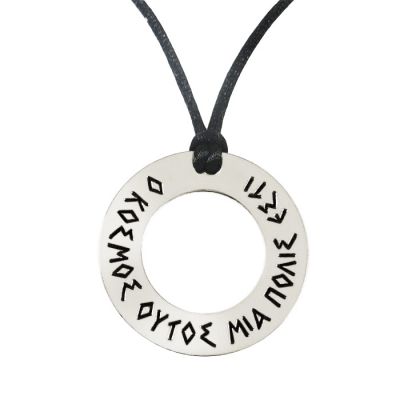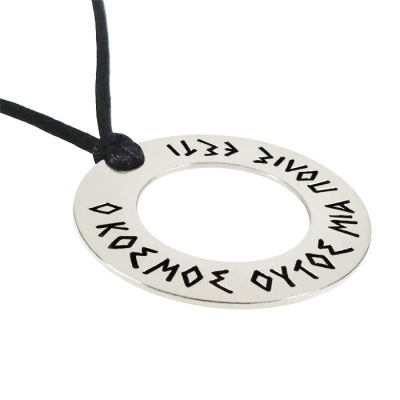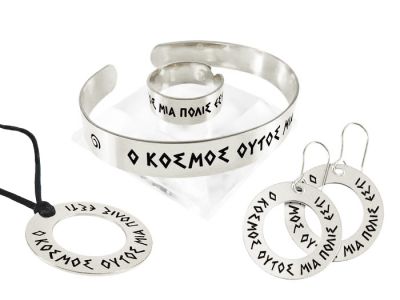We created a special pendant with the shape of a ring that bears the ancient proverb "o kosmos oytos mia polis esti", which means that "the world of ours is a single city". The ancient proverb of Epictetus, famous ancient philosopher, inspired us to create this beautiful jewel, made of silver 925°, for the admirers of the ancient greek knowledge and wisdom.
You may also like to see the earrings, the bracelet and the ring of the "World" collection.
Diameter: 3,8cm
Your necklace is also available with a silver chain, 42cm or 62cm. Click on the dimension of your preference and add it to your shopping cart.
All prices include VAT.
Epictetus (AD 55–135) wasa Greek sage and Stoic philosopher. He was born at Hierapolis,Phrygia and he spent his youth as a slave in Rome to Epaphroditos, a wealthy freedman and secretary to Nero.
Early in life, Epictetus acquired a passion for philosophy, and with the permission of his wealthy owner, he studied Stoic philosophy under Musonius Rufus. In some manner Epictetus obtained his freedom, sometime after Nero's death in the year 68 AD., and began to teach philosophy in Rome. About 93 AD., Emperor Domitian banished all philosophers from the city, and Epictetus fled to Nicopolis in Epirus, Greece, where he founded a philosophical schooland he lived there for the rest of his life.
No writings of Epictetus himself are really known. His discourses were transcribed and compiled by his pupil, Arrian. The main work is The Discourses, four books of which have been preserved (out of an original eight).Arrian also compiled a popular digest, entitled the Enchiridion, or Handbook.
Both the Discourses and the Enchiridion begin by distinguishing between those things in our power (prohairetic things) and those things not in our power (aprohairetic things). We have no power over external things, and the good that ought to be the object of our earnest pursuit, is to be found only within ourselves. The determination between what is good and what is not good is made by the capacity for choice (prohairesis).
Suffering occurs from trying to control what is uncontrollable, or from neglecting what is within our power. Epictetus maintains that the foundation of all philosophy is self-knowledge, that is, the conviction of our ignorance and gullibility ought to be the first subject of our study.
No posts found











